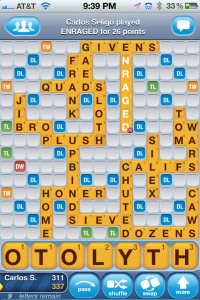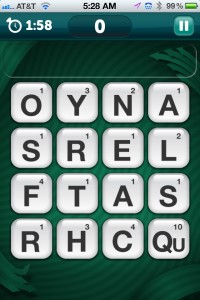I like to play word games. Scrabble and Boggle are two of my childhood favorites, and nowadays I play Zynga’s “With Friends” versions of both games on my phone. (If you want to play me, look for “cassidyjcurtis” or “otherthings”!)
Both games are about scrambling letters up into words, and both make heavy use of the anagram-loving part of me. But I’ve noticed that the two games produce very different mental states. The reason has to do with how they make use of time.

In Scrabble, there’s no time limit. You’re free to take as long as you want to play a word, but you can’t take it back once you’ve played it. The effect that has, on me anyway, is to make me an optimizer. I try to find the best possible word for the given moment, taking everything into account: the score, the state of the board, the consonant-to-vowel balance of my rack, how many letters are left, and so on. It’s a complex mix of concerns, and sometimes I just can’t see any option that’s clearly the best. But because I know my vocabulary is limited, I always suspect that a better word is out there that I’m just not seeing. When this happens, I get stuck, unable to play, effectively paralyzed. So Scrabble as a game makes me happy when I’m doing well, and miserable when I’m not. It’s not so much about the score of the game, as whether I’m measuring up to some abstract ideal of the perfect player. What a headache!

In Boggle, there’s a hard time limit, and the goal is to find as many words as you can in that time. Some words are worth more than others, of course, but it’s usually better to find lots of small words than a handful of huge ones. So when the clock starts ticking, I just start finding words as fast as I can, with no time wasted on judging good from better. And what I find tends to happen is that small words lead to bigger words, in a stream-of-consciousness kind of way that’s energetic but not stressful, and just a lot of fun. I only pop up to look at the big picture when the vein I’m mining runs dry. And before I know it, time is up, and I’ve finished my turn exhilarated by the effort. Sometimes I win, and sometimes I lose, but I always enjoy the game. And enjoying the game, feeling that state of flow and fun, directly impacts my ability to play it well.
What this has to do with animation, or any complex creative work, should be pretty clear. You can approach a new shot in either way: give yourself all the time in the world to find the best possible idea, or give yourself a hard time limit (to accomplish some part of the job) and just start exploring, and then see what you’ve got when your time runs out.
I’ve experimented with the size of the task and the length of the time limit. And what I’ve noticed surprised me: the shorter the time limit, the more fun I have. And more fun leads to better quality work. I do still feel the urge to optimize sometimes. But on my best days, I’m too busy playing to notice.

This is so true, though I never linked it to the way we play, which is the genius of your perspective! Whenever other designers tell me that they are blocked and don’t know where to start, I tell them to just get on with it.
If you simply start by putting down anything, that start will lead to more designs and eventually (hopefully) better ones. The fact that you’ve come to this via play makes it so much less of a “pull your socks up and stop whining” and more of a call to be playful and light in one’s approach to creative work.
In future I will be able to sound like much less of a miserable git (in giving myself this advice too), so thank you!
Cool, glad you liked it Sonia! I’m not surprised the same thing happens to designers…
No time limit? You’re definitely not playing Scrabble with tournament rules, then. :)
Haha, totally true. Maybe I’d find tournament Scrabble more relaxing! ;-)
I am no good at the blind rush of thoughtless words (except when I am talking!) but when I am playing Scrabble I am not thinking about score and balance or any of the criteria you mention, at least not at first. Both you and the only other player I play with regularly are better than me, but this is the first time in my life that has been the case. I have always been so much better than my opponents that I am playing with the scrabble board like a Weegee board, or making some kind of automatic writing Burroughs cut-up where the juxtapositions talk t me like an entrail reading about …everything. That is the “perfect” I am shooting for, but because you are good I find myself constantly tempted to use obscure science word from work, or even worse, not obscure vocabulary, super-common (but only in Scrabble): Qi anyone? or ka, or jin or jinn ir djin or djinn, or jinni, or djinni or djinny! Just yesterday I facebooked the first two words of a game that were totally perfect: “ecstatic” crossed with “mantras”. Despite the 35 point bonus ecstatic passed through no real bonuses (so was worth less than 50)…but of course I want a high score and pretty soon I am back at my rack of tiles agonizing for a way to use my Q. I think the trick is to forget the goal, by following whatever your bliss is, and after wanking with this mind-lube for awhile, to betray the bliss and maximize stock holder value by just selling out with the vocab that wins. probably I would be richer if I did this more when I opened my mouth as well.
It’s really funny, Carlos, that you think I’m better than you at Scrabble, when you kick my butt at it pretty consistently and apparently without even trying!
There’s much to be said for the Zen approach, of winning by not winning. But what you’re really doing is just inventing your own set of rules that are independent of the scoring system. Instead of points, you get a little squirt of serotonin for continuing the Exquisite Corpse poem, or closing a topological loop, or whatever. You’re still optimizing something, it’s just not the score. The problem is, a lousy rack is a lousy rack no matter what rules you play by, and you ultimately have to come back to the game.
I’m sure it’s possible to play Scrabble with Zen-Boggle-mind, but if I did that I would lose even more often, and I wouldn’t learn as much from playing. The game’s just not structured to reward that approach.
Actually, it is not only possible to be rewarded by that approach: it’s necessary! Very soon you will want to teach Stella and the way to play with a child is to NOT EVEN to take turns, but just scramble away rushing to reach the place you see your tiny word before the other and just learning to respect each other’s fingers. Let her use ANY word where you can tell what she meant, in Potuguese, English , slang, proper name, misspelled, whatever. And photograph the board for us. I will be your gypsy and tell you what it all means!
Sounds like a topic for a later post: “boring rules invented by grownups and their impact on fun”! ;-)